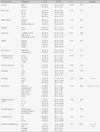Abstract
Purpose
Objectives of this study were to identify factors influencing depression in patients with chronic renal failure according to patient characteristics and to provide basic data to develop nursing interventions for depression in these patients.
Methods
This descriptive correlative study was conducted using structured questionnaires with 114 patients diagnosed with chronic renal failure. Data were analyzed using t-tests, ANOVA, Pearson's correlation and multiple regression analysis with SPSS/WIN 18.0.
Results
1) Level of depression was different according to the history of smoking (p<.001), past health history (p=.001), only drugs as therapy, peritoneal dialysis, hemodialysis (p=.028), and perceived health status (p<.001); 2) Significant correlations were found between depression, stress, value of life and social support; 3) multiple regression analysis showed that stress (β=.24, t=3.41, p=.001), value of life (β=-.46, t=-6.37, p<.001) and social support (β=-.19, t=-2.79, p=.006) in that order contributed to depression and explained 56.4% of variance in depression.
Conclusion
Findings from this study indicate that health professionals should provide proper management for depression for patients with chronic renal failure, as well as factors influencing depression, including stress, value of life and social support. There is also a need to implement stress management and self-help group programs for these patients.
Figures and Tables
References
1. Bai JY, Jeong ST, Noh MS, Sohn HS, Hong JH, Yeom SR, et al. Construction of the Busan injury surveillance system and middle and long-term planning for WHO international safe community promotion. Busan: Busan Metropolitan City and Inje University.
2. Beck AT, Ward CH, Mendelson M, Mock J, Erbaugh J. An inventory for measuring depression. Arch Gen Psychiatry. 1961; 127:561–571.

3. Choi MK, Lee YH. Depression, powerless, social support, and socioeconomic status in middle aged community residents. J Korean Acad Psychiatr Ment Health Nurs. 2010; 19:196–204.

4. Choi SO, Lee JJ, Kim SN, Shin KI, Jung YJ. Development of elderly meaning in life (EMIL) scale. J Korean Acad Nurs. 2003; 33:414–424.
5. Cukor D, Peterson RA, Cohen SD, Kimmel PL. Depression in end-stage renal disease hemodialysis patients. Nat Clin Pract Nephrol. 2006; 104:678–687.

6. Finkelstein FO, Finkelstein SH. Depression in chronic dialysis patients: Assessment and treatment. Nephrol Dial Transplant. 2000; 15:1911–1913.

7. Folkman S, Lazarus RS. If it changes it must be a process: Study of emotion and coping during three stages of a college examination. J Pers Soc Psychol. 1985; 48:150–170.

8. Fukuhara S, Green J, Albert J, Mihara H, Pisoni R, Yamazaki S, et al. Symptoms of depression, prescription of benzodiazepines, and the risk of death in hemodialysis patients in Japan. Kidney Int. 2006; 70:1866–1872.

9. Go AR. The relations of meaning in life, uncertainty and anxiety in patient with chronic renal failure. Busan: Busan Catholic University;2004. Unpublished master's thesis.
10. Glassman AH. Cigarette smoking: Implications for psychiatric illness. Am J Psychiatry. 1993; 150:546–553.

11. Goodman E, Capitman J. Depressive symptoms and cigarette smoking among teens. Pediatrics. 2000; 106:748–755.

12. Hur J. A Study on the relationship of the treatment elated-stressors and stress coping methods of hemodialysis noncompliant patients. Seoul: Ewha Womans University;2005. Unpublished master's thesis.
13. Jang MH, Kim YH. The relationship of stress, depression and suicidal ideation in the elderly. J Korean Acad Psychiatr Ment Health Nurs. 2005; 14:33–42.
14. Jeon SJ. Study of stress and correspondence in hemodialysis patients. Seoul: Yonsei University;1985. Unpublished master's thesis.
15. Jin DC, Ha IS, Kim NH, Lee SW, Lee JS, Yoon SR, et al. Current renal replacement therapy in Korea. Seoul: ESRD Registry Committee, Korean Society of Nephrology.
16. Jung YS, Park SS, Min EJ, Han BH, Eum EA, Rim H. Changes of depressive symptoms and nutritional indices after antidepressant treatment in the patients with chronic hemodialysis and depression. Korean J Nephrol. 2008; 27(3):94–101.
17. Katon W, von Korff M, Ciechanowski P, Russo J, Lin E, Simon G, et al. Behavioral and clinical factors associated with depression among individuals with diabetes. Diabetes Care. 2004; 27:914–920.

18. Kimmel PL, Peterson RA. Depression in end-stage renal disease patients treated with hemodialysis: Tools, correlates, outcomes, and needs. Semin Dial. 2005; 18:91–97.

19. Kim YJ. A study on uncertainty and general wellbeing of hemodialysis patients. Seoul: Konkuk University;2009. Unpublished master's thesis.
20. Lee YB. The relationship between depression and quality of sleep in peritoneal dialysis patients. Busan: Kosin University;2006. Unpublished master's thesis.
21. Lee YH, Song JY. A study of the reliability and the validity of the BDI, SDS, and MMPI-D scales. Korean J Clin Psychol. 1991; 10(1):98–113.
22. Martini S, Wagner FA, Anthony JC. The association of tobacco smoking and depression in adolescence: Evidence from the United States. Subst Use Misuse. 2002; 37:1853–1867.

23. Ministry of Health & Welfare. Statistics result in cause of death. Seoul: Author;2009.
24. Oh HS. Study on the relationship between perceived social support and performance of self care by hemodialysis patient. Daejun: Daejun University;2000. Unpublished master's thesis.
25. Park SJ. The incidence of gastrointestinal symptoms and depression in hemodialysis patients and its impact on quality of life. Seoul: Chung-Ang University;2009. Unpublished master's thesis.
26. Patton GC, Carlin JB, Coffey C, Wolfe R, Hibbert M, Bowes G. Depression, anxiety, and smoking initiation: A prospective study over 3 years. Am J Public Health. 1998; 88:1518–1522.

27. calco MZ, Almeida OP, Hachul DT, Castel S, Serro-Azul J, Wajngarten M. Comparison of risk of orthostatic hypotension in elderly depressed hypertensive women treated with nortriptyline and thiazides versus elderly depressed normotensive women treated withnortriptyline. Am J Cardiol. 2000; 85:1156–1158.
29. Shim HJ. The relationships among physical state, selfcare, social support and depression in hemodialysis patients. Masan: Kyungnam University;2003. Unpublished master's thesis.




 PDF
PDF ePub
ePub Citation
Citation Print
Print






 XML Download
XML Download